From Syria to Sweden: Eiad´s perilous voyage across the Mediterranean
Eiad’s wife did not want him to embark on the perilous journey across the Mediterranean Sea to safety in Europe, but Eiad believed it was their only option. They had tried to build a new life in Egypt, but after two years in the country, Eiad realized he would not be able to provide a good future for his young children there. “Life wasn’t very good in Egypt”, he explains. In spite of his wife’s protests, Eiad decided to risk his life in a rickety boat sailing from Egypt to Italy. His wife and children returned to Damascus. “I was more worried about the kids”, he says. “I thought that if my life will finish, it will finish anyway – in Egypt, in the sea, wherever.”
After one and a half months of searching, he made contact with a human smuggler. The price for getting to Europe: 2,500 dollars. “We went in a group so it would be cheaper. The safest way to travel to Europe is through Turkey but it’s much more expensive. Sometimes, it can cost more than 8000 dollars per person” says Eiad. He describes the five-day boat journey to Italy with more than 300 others as “hell”- people were thrown into the boat and the smugglers did not care if they fell into the water. “If they had animals with them, they would take better care of them because they’re worth more to them”, says Eiad. Still, there was a sense of solidarity between passengers. Eiad recalls how two people almost fell off the boat in their sleep but were caught by the other passengers.
After reaching the shores of Italy, Eiad headed towards Northern Europe and arrived in Sweden on 12 October 2014. Coming here was a great relief, but life as a refugee has its daily struggles. “I miss my family” says Eiad, explaining how he had to adjust to his new life at the asylum-seeker reception centre in Farsta, Stockholm. “Starting over is not easy and leaving your country without your family… it’s hard. A lot of people who came here didn’t want to leave their lives behind in Syria. But it is impossible to give them back the same life here…They are forced to change” he says sadly.
For 36-year-old Eiad, a former shop and restaurant owner, living a slower paced life at the reception centre is a challenge. He often plays cards with some of the other people at the centre to make time pass faster and sometimes he also plays football. “But I have a problem with my back so I can’t do too much sport.” He believes life moves slower in Sweden. “In Syria, we do everything fast. A lot of Arabs find this very frustrating because we are always in a hurry” says Eiad with a laugh,
“We want things to happen faster, and we want to be reunited with our families sooner.”
Eiad says he has not started his life in Sweden yet, not without his family. “Your mind is not clear, it’s with your family, your kids, and you’re waiting to see them.” But despite the continuing concerns for his family, Eiad is hopeful for the future. “I want to finish my studies or work and study at the same time. I don’t like to sit still.” He hopes to use the skills he acquired as a restaurant owner in Syria to start a small restaurant in Sweden, serving Syrian food.
Eiad’s application for asylum has just been approved and he is waiting to be reunited with his wife and two sons, who are still in Syria. “My children are very excited about coming to Sweden”, says Eiad with a big smile. “My wife is worried because she doesn’t know anyone here and it’s strange for her. But I think she’s going to like it. She is an English teacher” he says proudly.
Page 15 of 33
-
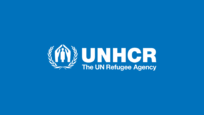
UNHCR observations to Danish urgency law for people displaced from Ukraine
20.03.2022UNHCR’s Representation for the Nordic and Baltic Countries has submitted observations on the Urgency Law for people, displaced from Ukraine. On 16 March 2022, and to mirror the European Unions Temporary Directive, the Danish Parliament adopted a law which secures a two-year permit to those fleeing Ukraine (including nationals and […]
-
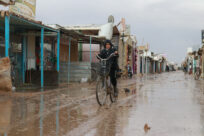
Nordic and Baltic funding provided warmth for Syrian refugees during freezing winter
17.03.2022Vital contributions from Denmark, Estonia, Finland, Norway and Sweden helped UNHCR ensure winter assistance to Syrian refugees in Jordan and other countries in the region.
-

Eleven years on, mounting challenges push many displaced Syrians to the brink
15.03.2022This is a summary of what was said by UNHCR spokesperson Boris Cheshirkov – to whom quoted text may be attributed – at today’s press briefing at the Palais des Nations in Geneva.
-

Norwegian funds come at vital time for people fleeing Ukraine
14.03.2022As Europe is facing the fastest growing refugee crisis since World War II, UNHCR welcomes Norway’s strong support and solidarity with people fleeing the hostilities in Ukraine.
-
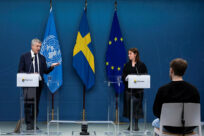
UN High Commissioner for Refugees visited Sweden
11.03.2022UN High Commissioner for Refugees Filippo Grandi visited Stockholm on 9 March 2022.
-
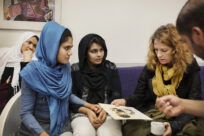
“Nothing about us without us”: UNHCR and partners share methods for creating inclusive societies
11.03.2022UNHCR and civil society organizations shared experiences on integration and inclusion of refugees during the online integration conference, Week of Neighbors.
-
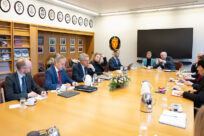
UN High Commissioner for Refugees visited Norway
10.03.2022UN High Commissioner for Refugees Filippo Grandi visited Oslo on 8 March 2022.
-

News Comment: UNHCR’s Grandi praises Europe’s welcome for Refugees fleeing Ukraine
09.03.2022Statement attributed to the UN High Commissioner for Refugees, Filippo Grandi
-
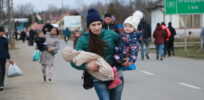
Sweden’s support provides a lifeline to people fleeing and displaced in Ukraine
08.03.2022More than 2 million people have now fled Ukraine to neighbouring countries. Inside Ukraine, UNHCR estimates that around 1.8 million people have been displaced to date. The humanitarian needs are enormous and rapidly increasing. UNHCR is strengthening the response, in Ukraine and in neighboring countries, and UNHCR staff is working […]
-

Covid-19 and climate crisis worsen inequalities for displaced women and girls
08.03.2022Statement attributed to the UNHCR Assistant High Commissioner for Protection, Gillian Triggs
